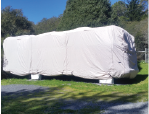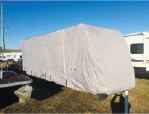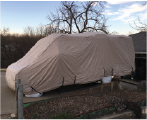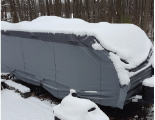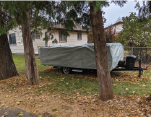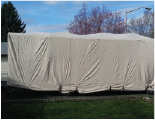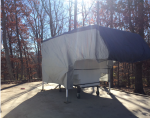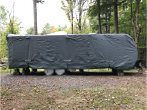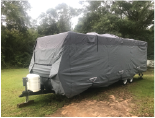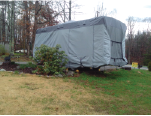
Is your trailer's condition deteriorating? If yes, there is still time to save your investment with the travel trailer cover. It will help prevent damage and keep your trailer in good condition.
But wait, before you grab a cover, there’s one thing you’ve got to get right—measuring your trailer. A crucial step. If you just guess or eyeball it, you might end up with a cover that’s way off. Too small? It won’t fit. Too big? It’ll flap around like crazy and let in dust and rain. That’s pretty much asking for trouble.
A perfect size means your trailer stays clean, dry, and safe from the weather. It also saves you money in the long run, because let’s be real, replacing or fixing a damaged trailer isn’t cheap.
In this guide, we’ll show you exactly how to measure your trailer step by step, what to avoid, and brands that offer the best cover.
Let’s get into it!
Prep Guide for Fitting a Travel Trailer Cover
Ready for the first step? Let’s start with what will come in handy before you begin measuring. You don’t need fancy tools, just a few basics to make the job quick and simple.
Measuring tape: A basic but important tool. A long measuring tape that is 25 or 50 feet.
Step ladder: Is your trailer tall? Get a handy ladder to reach the roofline.
Notepad or your phone: So you can write down your numbers right away.
A friend or helper: It's optional, but having someone hold the other end of the tape can complete the measurement task hassle-free.
Figure Out Your Trailer Type
It’s important to know what TYPE of trailer you have. Different trailers have different shapes, structures, and measurement requirements. Here are the most common trailer types:
Travel Trailer
These are the most common towable RVs, ranging from compact to large sizes. They have a traditional box shape and connect to a rear bumper hitch. For this, you need to measure the full body length, including bumpers and spare tires, but not the hitch.
Typical size: 15 to 35 feet long
Example: Forest River Salem (27 ft), Jayco Jay Flight (33 ft)
Fifth-Wheel Trailer
Fifth-wheels are larger trailers that attach to a special hitch in the bed of a pickup truck. They have a raised front section that extends over the truck bed. When measuring, include the entire body length but exclude the hitch overhang unless specified by the cover manufacturer.
Typical Dimensions: 33–42 feet long, 8–8.5 feet wide
Example: Keystone Montana 3121RL
Teardrop/Camper Trailer
These trailers are compact and aerodynamic, usually have a curved teardrop shape. They’re typically shorter and lighter. Measure from front to rear body, but ignore the tongue unless you’re using a camp trailer cover that accommodates it.
Typical size: 25 to 45 feet long
Example: Keystone Montana (40 ft), Grand Design Reflection (35 ft)
Toy Hauler
A toy hauler is a hybrid between a trailer and a garage, often with a rear ramp door for ATVs or bikes. Their dimensions are bulkier, so be sure to include any rear bump-outs or extended garages.
Typical size: 20 to 40 feet long
Example: Heartland Torque (33 ft), Forest River XLR (38 ft)
Pop-Up Trailer
Pop-ups are collapsible campers with a low profile when folded down. Measure the trailer in its folded-down travel position. Don’t include roof extensions or tent sections, as covers are made for the closed configuration.
Typical size (folded): 8 to 18 feet long
Example: Jayco Jay Sport (17 ft), Coachmen Clipper (14 ft)
How to Measure Your Trailer for the Perfect Cover
The right measurements mean you are very close to getting the right travel trailer cover. If you miss one point, either the cover is too small, it won’t fit, or it’s too big, it may flap in the wind or hold water. Here’s how to measure your trailer step-by-step so your cover fits just right.
1. Measure the Length (Front to Back)
Use a tape measure and start from the front end of your trailer (not the hitch) and measure to the very back.
Make sure to include anything attached to the back, like:
- Spare tires
- Ladders
- Rear storage racks
Don’t include the front hitch or tongue unless the cover says it fits over it.
Why This Is Important:
Covers are made to fit the full body of the trailer. If you leave out the ladder or spare tire, your cover may come up short.
Example:
If your trailer is listed as 24 feet long but has a ladder on the back, your actual length might be 25 or 26 feet. Always measure the full body, not just the floor or what’s in the manual.
2. Measure the Width (Side to Side)
Measure across the trailer at the widest part, from one sidewall to the other.
Don’t include:
- Awning arms
- Side mirrors
- Slide-outs (unless you're buying a special cover for those)
Why This Is Important:
You want the cover to wrap tightly around your trailer. If it’s too narrow, it won’t cover properly. If it’s too wide, it may flap or sag.
Typical Widths:
- Most trailers: 8 to 8.5 feet wide
- Small trailers/teardrops: 5 to 7 feet wide
3. Measure the Height (Ground to Roofline)
Measure from the ground to the top of the roof (the flat surface, not the things on top).
Don’t include:
- AC units
- Satellite dishes
- Solar panels or roof vents
Why This Is Important:
Covers are designed to stop at the roofline. If you measure to the top of your AC unit, the cover may be too tall and hang loosely.
Example:
If your trailer is 11 feet tall to the roof and 13 feet tall with the AC unit, you should use the 11 feet measurement.
Common Mistakes to Avoid
- Relying on the brochure or spec sheet without physically measuring
- Forgetting to include fixed rear accessories (like a ladder or tire)
- Including rooftop add-ons in height measurements
- Rounding down instead of rounding up slightly for better coverage
Top Brands Known for Quality Trailer Covers
Looking for a cover that fits your trailer perfectly and lasts for years? Here are some of the most trusted brands known for their performance, durability, and design. Simply choose your trailer size, pick your preferred color, and match it to your budget.
1. Expedition
A customer favorite, Expedition RV Covers are well-known for their reliable protection and marine-grade roof. Designed to withstand the elements, it’s a classic choice that delivers performance year after year.
Color: Grey
Size: Fits 37' Travel Trailer
Dimensions: 462" L x 102" W x 104" H
Warranty: 3 Years
Key Features:
- Genuine Expedition construction
- Waterproof Marinex™ marine-grade roof
- High hydrostatic pressure resistance
- Free storage bag, ladder cap, and protective gear
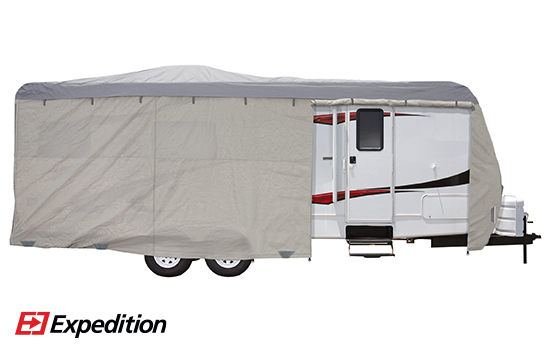
2. Goldline
For those who want the absolute best, Goldline RV Covers are built with premium knitted fabrics and full marine-grade wrapping. Known as the “King of Covers”, they combine strength with sleek design, offering unmatched durability and UV protection.
Color Options: Two
Size: Fits 37' Travel Trailer
Dimensions: 462" L x 102" W x 104" H
Warranty: 5 Years
Key Features:
- Full Marinex wrap for complete waterproofing
- Highest hydrostatic pressure rating in its class
- Maximum UV inhibitor protection
Includes endurance roof straps, ladder cap & executive storage bag
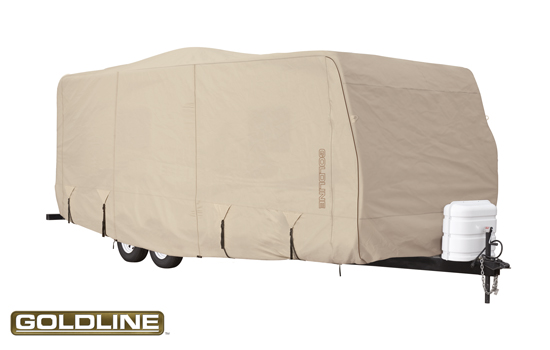
3. WeatherMaster
The WeatherMaster Cover is a great mid-range option, offering better quality than many budget covers on the market. With a 4-layer fabric and EZ-FIT design, it’s perfect for all-around outdoor protection.
Color: Rainier Gray
Size: Fits 37' Travel Trailer
Dimensions: 462" L x 102" W x 104" H
Warranty: 2 Years
Key Features:
- Durable Durapel™ marine-grade fabric
- Easy-fit design for hassle-free installation
- Free storage bag included
Designed in the USA for long-lasting performance
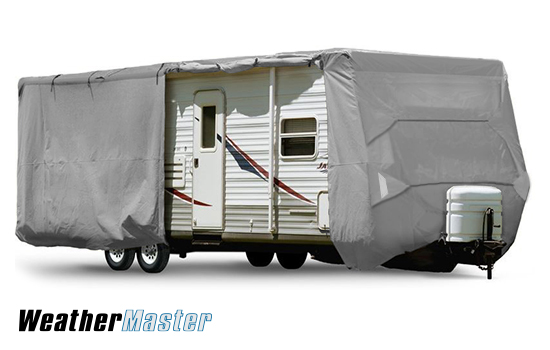
Final Check Before You Buy
- Double-check the brand’s size chart
- Confirm the return or exchange policy
- Choose covers with reinforced corners
- Look for zippers and ventilation panels
- Make sure it includes tie-downs or straps
- Consider UV protection and waterproof rating
- Pick a color and style that suits your needs
Final Thought!
You don’t want to deal with returns or struggle with a cover that doesn’t fit your trailer properly. This guide is here to help you get it right the first time. With a few quick measurements and the right tips, you’ll find a travel trailer cover that fits like a glove. Save time, avoid hassle, and protect your trailer the way it deserves.

.png)
